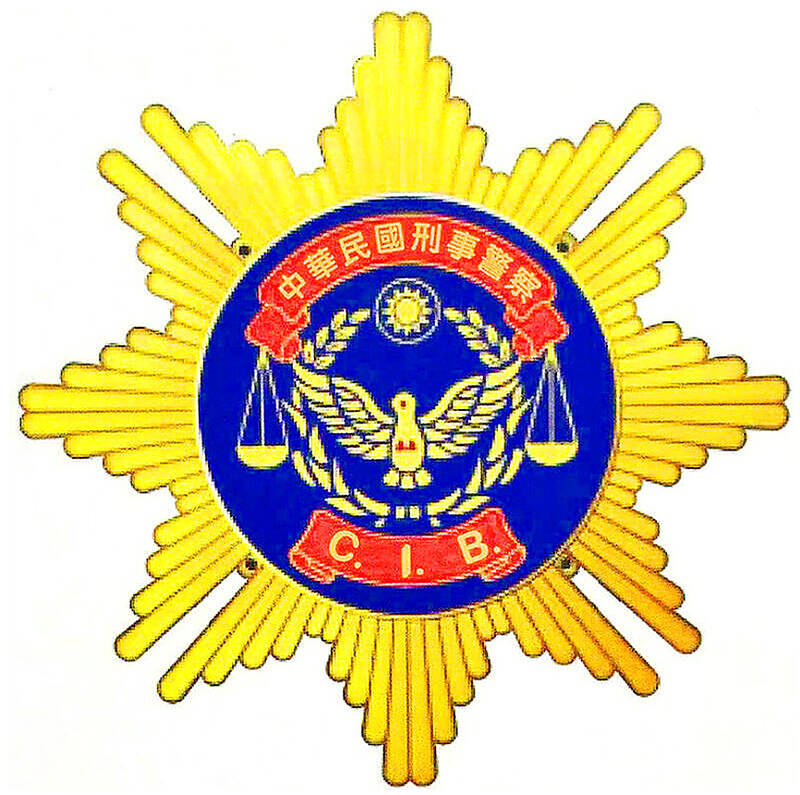Four suspects have been arrested for allegedly defrauding victims out of more than NT$16 million (US$487,344) via “self-help programs,” the Criminal Investigation Bureau said on Friday.
The bureau said it launched an investigation in April after reports that a 66-year-old woman named Chang Shu-chun (張淑珺) was allegedly defrauding her students.
Chang, her husband and two assistants were handed over to the Taipei District Prosecutors’ Office on suspicion of fraud and extortion, police said.

Screen grab from the Bureau’s Facebook page
Four students, who had allegedly beaten their fellow students under Chang’s instructions, were also sent to the prosecutors’ office on suspicion of causing bodily harm, they added.
Chang graduated from National Taipei College of Business, which is now known as the National Taipei University of Business, and has published two self-help books, police said.
She said she had trained in spiritual mentoring and set up “the cleansing academy of new heart human futurology” at a rented space in New Taipei City’s Sindian District (新店) in 2009.
The facility operated along with a cafe and a massage parlor, and was aimed at people who were seeking therapy for issues such as cancer or workplace problems, or those who were eager to make a fortune, police said.
Chang allegedly said that the academy could cure diseases forever and help students earn a NT$10 million annual income, providing self-help or immersive English programs that cost NT$700,000 to NT$1 million each, they said.
Three students said Chang defrauded them of more than NT$16 million in total, police said.
Chang allegedly demanded that students obey her “unreasonable instructions,” including getting married to monitor each other or committing obscene acts in front of other students, police said, adding that students who refused would reportedly have to slap themselves in the face or kneel in apology, otherwise they would be beaten.
She also allegedly ordered students to work for her cafe and massage parlor when they could not afford the tuition and fined them for not washing a cup or sweeping leaves on the floor, police said.
Chang has denied the accusations that her programs were illicit, saying her instructions were part of the programs and the students had consented, adding that they could have left whenever they were unwilling to continue.
Police said Chang and her accomplices exploited the students for money and used peer pressure to form a closed group in the academy, where the students, stressed out and frightened, lost their sense of good judgement and could not escape their control.
Asked about the case, Taipei Counseling Psychologists Association chairperson Lan Yi-feng (藍挹丰) on Friday said there are only four different mental healthcare professionals in Taiwan: psychiatrists, counseling psychologists, clinical psychologists and social workers.
If someone says they are a mental therapy professional or that they can perform therapies despite their suspicious job titles, people could consult the Ministry of Health and Welfare’s “query system for medical personnel and facilities” or request relevant license numbers to check the truthfulness of their claims, she said.
It is normal to become mentally fragile in the face of diseases and life struggles, and to fall victim to deceitful remedies or therapies, Lan said, calling on those suffering not to blame themselves.
Additional reporting by CNA

An essay competition jointly organized by a local writing society and a publisher affiliated with the Chinese Communist Party (CCP) might have contravened the Act Governing Relations Between the People of the Taiwan Area and the Mainland Area (臺灣地區與大陸地區人民關係條例), the Mainland Affairs Council (MAC) said on Thursday. “In this case, the partner organization is clearly an agency under the CCP’s Fujian Provincial Committee,” MAC Deputy Minister and spokesperson Liang Wen-chieh (梁文傑) said at a news briefing in Taipei. “It also involves bringing Taiwanese students to China with all-expenses-paid arrangements to attend award ceremonies and camps,” Liang said. Those two “characteristics” are typically sufficient

A magnitude 5.9 earthquake that struck about 33km off the coast of Hualien City was the "main shock" in a series of quakes in the area, with aftershocks expected over the next three days, the Central Weather Administration (CWA) said yesterday. Prior to the magnitude 5.9 quake shaking most of Taiwan at 6:53pm yesterday, six other earthquakes stronger than a magnitude of 4, starting with a magnitude 5.5 quake at 6:09pm, occurred in the area. CWA Seismological Center Director Wu Chien-fu (吳健富) confirmed that the quakes were all part of the same series and that the magnitude 5.5 temblor was

The brilliant blue waters, thick foliage and bucolic atmosphere on this seemingly idyllic archipelago deep in the Pacific Ocean belie the key role it now plays in a titanic geopolitical struggle. Palau is again on the front line as China, and the US and its allies prepare their forces in an intensifying contest for control over the Asia-Pacific region. The democratic nation of just 17,000 people hosts US-controlled airstrips and soon-to-be-completed radar installations that the US military describes as “critical” to monitoring vast swathes of water and airspace. It is also a key piece of the second island chain, a string of

The Central Weather Administration has issued a heat alert for southeastern Taiwan, warning of temperatures as high as 36°C today, while alerting some coastal areas of strong winds later in the day. Kaohsiung’s Neimen District (內門) and Pingtung County’s Neipu Township (內埔) are under an orange heat alert, which warns of temperatures as high as 36°C for three consecutive days, the CWA said, citing southwest winds. The heat would also extend to Tainan’s Nansi (楠西) and Yujing (玉井) districts, as well as Pingtung’s Gaoshu (高樹), Yanpu (鹽埔) and Majia (瑪家) townships, it said, forecasting highs of up to 36°C in those areas